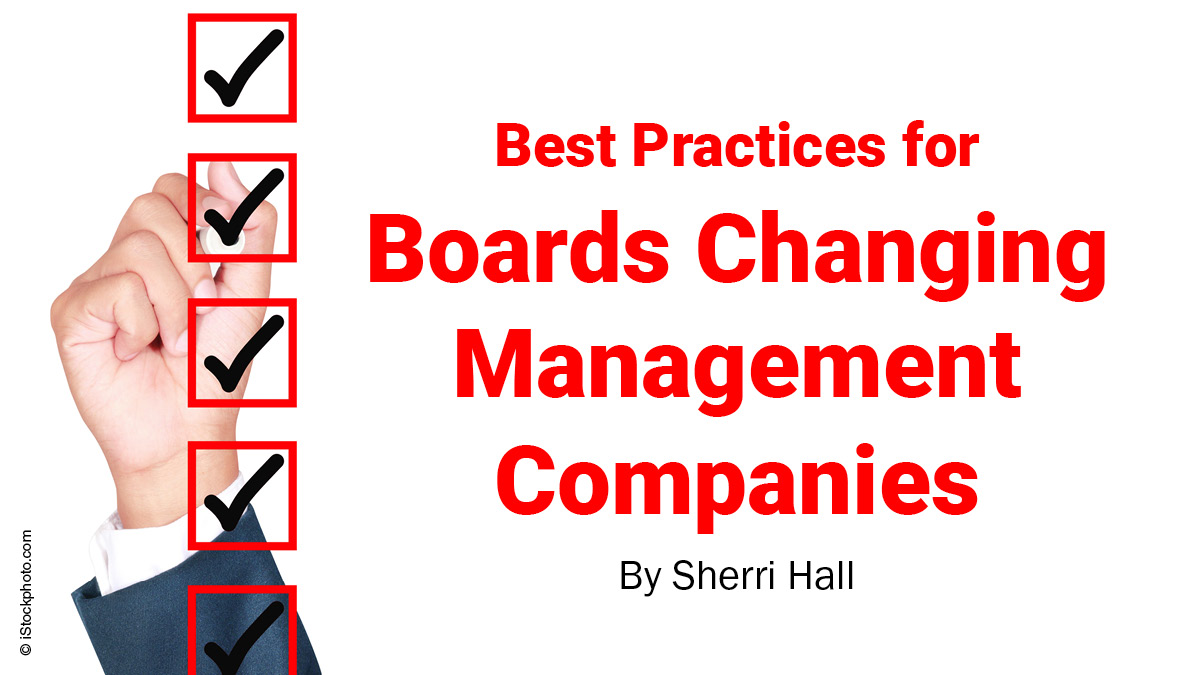
Best Practices for Boards Changing Management Companies
“Breaking up” may be hard to do but when an association is ready to call it quits with its property management company and enter into a new relationship, there are some best practices it should follow. We spoke to Leonard Barber, CPA, CMCA, PCAM, President of Executive Property Management in North Brunswick, New Jersey, who offered some insight on the matter.
First and foremost, said Barber, it is extremely important for the board to have an understanding of a property management company’s roles and responsibilities. This is especially true with a brand-new board, he noted. “New board members may come in and say ‘we want a change because we don’t like how the past board operated and we want to clean house.’ Before they make a decision though,” suggested Barber, “it’s important for them to have some working knowledge of what a management company does.”
In addition, the board should ensure it is ready to make the switch by ruling out other options. Barber suggests that the board discuss its concerns with the senior management of the current management company and allow the opportunity for operational changes to be made. A survey can also be performed to determine how community members perceive management’s performance. One solution could be changing the manager and not the company itself, Barber explained.
However, if the management company does not take the steps necessary to meet the needs of the community, then it is time to change companies. Poor communication on the part of the management company, such as not responding to homeowners’ requests for services is one potential reason for change. Even if a problem, such as a repair, cannot be addressed immediately due to weather or some other issue, it’s important for the management company to respond to the homeowner acknowledging the report was received and ensuring the matter will be resolved, said Barber. Other concerns that could potentially lead to a change in management companies include neglecting to return calls or emails, lack of periodic physical property inspections, not acquiring competitive bids for services and overall failure to perform according to the management contract, he explained.
Once it has been determined that it is in fact time to change management companies, the board should have a set of specifications that clearly defines its needs, said Barber. He also suggested appointing a management search committee that includes those with service-oriented or human resources experience. “The management company’s role is not only to manage the physical property, but also to effectively communicate with people such as homeowners, board members, professionals and contractors as well as provide timely and meaningful financial reporting,” Barber said.
So, what should an association look for in a management company and how can the board make a determination between companies? According to Barber, the board should visit a potential management company’s facilities to get a sense of how organized the company is as well as the atmosphere and retention of employees. “This is a good practice when changing companies,” he noted. In addition, Barber suggested that the board contact professionals in the industry, such as engineers, accountants and attorneys, to gain some more insight on the company. Even contractors who perform services for the community are a good resource as they have a strong sense about management companies they work with, and how effective they may be in managing “field” operations.
Barber also said technology and the ability of a management company to communicate through electronic means is important to associations today.
Another detail when changing companies that should not be overlooked is the management contract. The contract will include the management company’s roles and responsibilities as well as a section or clause regarding termination, explained Barber.
“It’s very important for the management contract to clearly define the expectations and how termination will be handled,” he said. One thing it should specify is a timeline for termination, such as on, two or three months, which can be further adjusted if there is negligence or fraudulence on the part of the management company. “The contract,” said Barber, “should also indicate the expectation of the board that the outgoing management company will provide full cooperation to the incoming company.” This includes making all books and records available to the new company,” he explained.
Once fully transitioned from the previous management company to the new company, the board should get some assurance that all the records have in fact been transferred, Barber noted. Although it is difficult for the incoming company to know exactly what records existed at the time the previous management company was in a position of responsibility, these documents should most definitely include items such as the associations’ governing documents as well as any correspondence files, insurance policies, meeting minutes and current contracts, he said. Since the board relies on its management company to ensure that the proper transfer of those records occurs, the management company should provide a checklist of items it expects to be transitioned from the former management company to the new one.
In conclusion, Barber added, a communication should be sent to all homeowners advising of the change in management. Included in this information would be the method for submitting payment of monthly fees to the association, as well as contact information related to the manager and any emergency services needed.